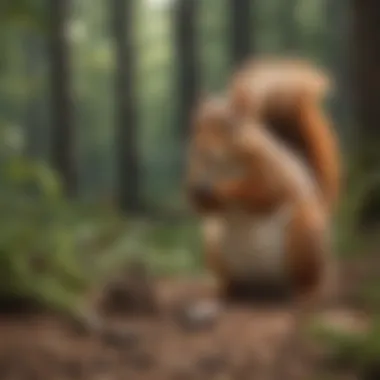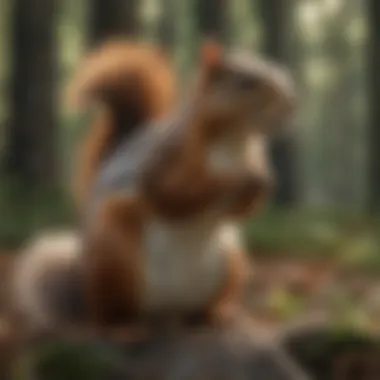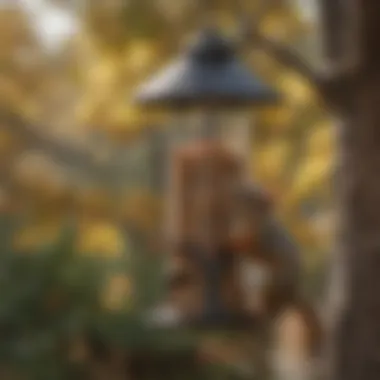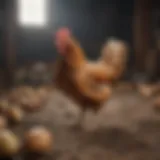Effective Ways to Keep Squirrels Away from Your Property and Garden


Animal Species Profile
Squirrels are small to medium-sized rodents characterized by their bushy tails and sharp incisors. These agile creatures typically have a slender body covered in fur that can vary in color from gray to red depending on the species. Squirrels are widely distributed across various habitats, including forests, urban areas, and parks, showcasing their adaptability to different environments. Known for their nimble movements and quick reflexes, squirrels exhibit curious and sociable behavior, often seen interacting with conspecifics in search of food and shelter.
When aiming to deter squirrels from invading your property, several strategies can be employed effectively. Starting with natural deterrents such as predator urine or spicy repellents can dissuade squirrels from venturing near. Additionally, installing physical barriers like fences or netting can prevent access to gardens or bird feeders. Utilizing motion-activated devices or sound emitters can also startle squirrels away from your property. Regularly removing food sources and sealing entry points will further discourage these creatures from establishing residence on your premises.
Conservation & Wildlife Efforts
While squirrels are not typically the focus of conservation efforts, certain species such as the Red Squirrel in the UK face threats due to habitat loss and competition with the Gray Squirrel. Conservation organizations like the Red Squirrel Survival Trust work to protect and conserve these native species through habitat restoration and awareness campaigns. Efforts to control invasive species population can also impact squirrel conservation indirectly, highlighting the interconnectedness of wildlife management strategies.
Animal Behavior & Psychology
Squirrels communicate through vocalizations, body language, and scent markings to convey information about territory and food availability. Their mating behavior involves elaborate courtship rituals, and females exhibit strong maternal instincts when caring for their young. Squirrels demonstrate remarkable problem-solving skills, especially in tasks related to acquiring food and avoiding predators. Their social dynamics include hierarchical structures within groups, with dominant individuals asserting control over resources and territory.
Unique Facts & Trivia
Did you know that squirrels have been observed engaging in deceptive behaviors to safeguard their food caches from potential thieves such as other squirrels? These clever rodents have also been known to use their bushy tails for communication and balance, showcasing both practical and aesthetic purposes. Fun trivia includes the ability of some squirrel species to leap up to 10 times their body length and rotate their ankles 180 degrees for climbing efficiency. Their adaptation to urban environments and creative problem-solving strategies make squirrels fascinating subjects for study and observation.
Pet Care & Tips
While squirrels are predominantly wild animals, some individuals may be licensed for domestication by experienced wildlife experts. However, caring for squirrels requires specialized knowledge and facilities to ensure their well-being and safety. Proper diet, enrichment activities, and veterinary care are crucial for squirrel health and longevity. Training techniques may include positive reinforcement to establish trust and cooperation with captive squirrels, emphasizing respect for their natural behaviors and instincts.
Understanding Squirrel Behavior
Understanding the behavior of squirrels is vital when it comes to effectively deterring these agile creatures from your property. By delving into their habits, nesting preferences, diet patterns, and activity times, you gain valuable insights that can aid in devising specific strategies to mitigate any potential damage they may cause. Learning about squirrel behavior allows you to anticipate their movements and understand their motivations, which is key to implementing successful prevention methods.
Insight into Squirrel Habits
Squirrel Diet Patterns
Squirrel diet patterns play a crucial role in their behavior and impact on your property. These animals have distinctive preferences when it comes to food, often leaning towards nuts, seeds, fruits, and even the occasional insect. Understanding their diet patterns can help in identifying attractants on your property that may draw squirrels in. By being aware of what they like to eat, you can take proactive measures to minimize food sources and discourage them from frequenting your premises.
Squirrel Nesting Preferences
Squirrels have specific nesting preferences that influence their behavior and territorial tendencies. These creatures nest in trees, attics, and other elevated spaces, seeking shelter and protection for themselves and their young. Being aware of their nesting habits enables you to locate and address potential nesting sites on your property. By disrupting their preferred nesting spots and making them less accessible, you can deter squirrels from establishing a presence in your vicinity.
Squirrel Activity Times
Knowing the activity times of squirrels is essential for effective deterrent strategies. Squirrels are often most active during the early morning and late afternoon, engaging in foraging, nest maintenance, and social interactions. By understanding when squirrels are likely to be active on your property, you can implement specific repellent techniques during these peak times. By targeting their periods of increased activity, you enhance the likelihood of deterring squirrels successfully.
Impact of Squirrels on Property
Garden Destruction
One of the significant impacts of squirrels on property is their tendency to cause garden destruction. These rodents have a voracious appetite for various garden plants, vegetables, and fruits, leading to extensive damage to crops and landscaping. Their digging and foraging behaviors can uproot plants and disrupt garden beds, potentially affecting the aesthetic appeal and productivity of your garden. Implementing protective measures to safeguard your garden from squirrel intrusion is paramount to preserving its health and vitality.


Home Damage
Squirrels can also inflict damage to homes, particularly through their gnawing and nesting activities. These animals may chew on wooden structures, electrical wiring, and insulation, posing fire hazards and structural compromises. By addressing potential entry points and fortifying vulnerable areas of your home, you can minimize the risk of squirrel-induced damage and protect the integrity of your property.
Health Risks
In addition to physical property damage, squirrels can pose health risks to humans and pets. Their droppings and urine may contain harmful pathogens that can spread diseases, such as leptospirosis and salmonellosis. Exposure to squirrel feces and urine can result in health complications, particularly in individuals with compromised immune systems or respiratory conditions. Implementing effective deterrent methods not only safeguards your property but also helps mitigate potential health hazards associated with squirrel infestations.
Natural Deterrents
In this detailed guide on effective ways to deter squirrels from infiltrating your property, natural deterrents play a pivotal role. These methods not only offer a humane approach but also provide long-term solutions. Natural deterrents highlight the essence of harmony between nature and property protection. By utilizing plant-based repellents and predator urine, you can create an uninviting environment for squirrels without causing harm.
Plant-based Repellents
Plant-based repellents are a safe and eco-friendly way to ward off squirrels from your property. Among these, the use of strong-smelling plants stands out as a potent strategy. These plants emit odors that squirrels find displeasing, deterring them from entering your garden or home. Common choices include lavender, mint, and rue.
Use of Strong-smelling Plants: Utilizing strong-smelling plants like lavender and mint adds a natural barrier against squirrel intrusion. The powerful scents act as a deterrent, creating an inhospitable environment for squirrels. Their aromatic properties not only repel squirrels but also enhance the overall ambiance of your surroundings.
Cayenne Pepper Solutions: Cayenne pepper solutions are another effective plant-based repellent. The spiciness of cayenne pepper irritates squirrels' senses, dissuading them from feeding on plants or nesting nearby. It serves as a cost-effective and easily applicable solution to squirrel infestation.
Marigold Planting: Marigolds are known for their pest-repelling properties due to their strong fragrance. Planting marigolds around your garden or home acts as a natural deterrent, keeping squirrels at bay. Additionally, marigolds add color and vibrancy to your space, enhancing its aesthetic appeal.
Predator Urine
Harnessing the power of predator urine is a strategic way to discourage squirrels. The scent of fox or coyote urine triggers the instinctive fear response in squirrels, prompting them to avoid areas where predators may be present. By strategically using predator urine, you can create a predator presence without harming any animals.
Effectiveness of Fox or Coyote Urine: Fox or coyote urine proves highly effective in deterring squirrels due to its resemblance to natural predator scents. This urine signals danger to squirrels, prompting them to steer clear of your property. Its natural composition ensures a non-toxic and environmentally friendly approach to squirrel control.
Application Methods: Applying predator urine strategically around your property's perimeter or near vulnerable areas amplifies its efficacy. Ensuring proper placement and replenishment of the urine enhances its deterrent effects, creating a protective barrier against squirrel intrusion.
Considerations: When using predator urine, consider factors such as weather conditions and reapplication frequency. Weather elements can dilute the scent, affecting its potency. Regularly inspecting and refreshing the predator urine ensures its consistent efficacy in deterring squirrels.
Physical Barriers
Physical barriers are an integral aspect of any comprehensive strategy to deter squirrels effectively from your property. These barriers serve as a practical means of preventing squirrel intrusion into areas where they may cause damage. A well-thought-out physical barrier plan can help protect your garden, home, and other property structures from potential harm. By implementing physical barriers, you create a physical deterrent that discourages squirrels from accessing vulnerable areas.
Fencing Solutions
Height and Material Selection
Height and material selection play crucial roles in the effectiveness of fencing solutions against squirrel interference. The height of the fence determines the level of protection it provides, with taller fences offering increased security. Opting for sturdy materials like metal or composite fencing enhances durability and resilience against squirrel attempts to breach the barrier. The choice of height and materials is fundamental in crafting a formidable defense system against squirrel intrusions.
Adding Electric Wire
Incorporating electric wire into your fencing system elevates its deterrent capabilities against squirrels. The electric charge emitted by the wire creates a deterrent effect that dissuades squirrels from attempting to climb or breach the fence. This additional feature enhances the overall effectiveness of the fencing solution, significantly reducing the likelihood of squirrel intrusion. While it requires proper installation and maintenance, the benefits of adding electric wire in deterring squirrels outweigh the initial effort.


Installation Tips
Proper installation is key to maximizing the effectiveness of fencing solutions in deterring squirrels. Ensuring the fence is securely anchored to the ground and free of gaps or openings is essential. Strategically placing the fence along squirrel-prone areas and reinforcing weak points with additional support enhances its functionality. Regular inspection and maintenance of the fence, such as trimming nearby branches that can aid squirrel access, are vital for long-term success. Following these installation tips diligently can significantly boost the efficacy of your fencing system.
Blocking Entry Points
Sealing Holes
Sealing off potential entry points such as holes in walls or structures is critical in preventing squirrel intrusion. By meticulously inspecting and sealing any openings that squirrels could exploit to gain entry, you effectively fortify your property against unwanted wildlife access. Utilizing appropriate sealants or barriers ensures a secure closure that deters squirrels from re-entering once blocked.
Securing Vent Covers
Safeguarding vents with secure covers acts as a proactive measure against squirrel incursions. Vent covers not only prevent squirrels from entering through ventilation systems but also offer added protection against other pests. Opting for durable and squirrel-proof covers reduces the risk of damages caused by wildlife while maintaining optimal airflow and functionality of the vents.
Repairing Damaged Areas
Timely repair of any damaged areas in your property's exterior is paramount in deterring squirrels. Any gaps, cracks, or weakened structures should be promptly addressed to eliminate potential entry points for squirrels. Conducting regular assessments and addressing repairs promptly help maintain the integrity of your property's defenses against squirrel intrusions and minimize the risk of ensuing damages.
Humane Repellent Techniques
Humane Repellent Techniques play a vital role in safeguarding your property from the relentless invasion of squirrels. By utilizing a humane approach, you not only protect your surroundings but also ensure the well-being of wildlife. These techniques are designed to deter squirrels without causing harm, striking a balance between human needs and animal coexistence.
Use of Scent Repellents
Scent repellents, such as Peppermint Oil, offer a natural and non-toxic way to deter squirrels from your property. The strong aroma of Peppermint Oil overwhelms squirrels' senses, making them avoid areas where it is applied. Its refreshing scent is pleasant to humans but repulsive to squirrels, creating an effective barrier against their intrusion.
Peppermint Oil
Peppermint Oil stands out for its potent scent that masks appealing odors for squirrels, deterring them from entering your space. Its natural composition makes it a popular choice for individuals seeking eco-friendly solutions. However, its efficacy might vary depending on environmental factors like wind or rain. While Peppermint Oil is a versatile option for repelling squirrels, consistency in application is key.
Ammonia Soaked Rags
Ammonia Soaked Rags emit a pungent smell that confuses and repels squirrels, discouraging their presence near your property. The strong odor overpowers squirrels' senses, signaling danger and urging them to stay away. However, caution must be exercised when using Ammonia Soaked Rags, as the smell might also affect other wildlife and pets in the vicinity.
Apple Cider Vinegar Spray
Apple Cider Vinegar Spray acts as a potent squirrel deterrent due to its sour scent that repels these creatures effectively. The acidic nature of the spray creates an unpleasant environment for squirrels, prompting them to seek alternative foraging grounds. While highly efficient, the strong odor of Apple Cider Vinegar Spray might linger for some time, requiring periodic reapplication to maintain its efficacy.
Sound and Light Devices
Incorporating sound and light devices provides an innovative approach to deterring squirrels from your property. These devices utilize technology to emit signals or lights that disrupt squirrels' comfort, prompting them to leave your premises. Sound and light devices offer a hands-free solution to squirrel infestations, operating autonomously to safeguard your space.
Ultrasonic Devices
Ultrasonic Devices emit high-frequency sounds that interfere with squirrels' communication and navigation systems, causing discomfort and motivating them to flee. The non-invasive nature of ultrasonic waves makes them an attractive option for repelling squirrels without disrupting human activities. However, effectiveness may vary based on the surrounding environment and the specific devices used.


Motion-activated Lights
Motion-activated Lights serve as a visual deterrent, illuminating dark spaces when squirrels approach, startling and deterring them effectively. These lights mimic natural predator behavior, creating an environment of perceived danger for squirrels. While motion-activated lights are a low-maintenance solution, proper placement and adjustments may be needed to maximize their effectiveness.
Solar-powered Noisemakers
Solar-powered Noisemakers combine light and sound elements to deter squirrels from your property. The integration of solar technology ensures continuous operation, making these devices eco-friendly and cost-effective. By emitting both auditory and visual signals, solar-powered noisemakers provide a comprehensive approach to squirrel repellent, enhancing the security of your space.
Professional Removal Services
In the realm of deterring squirrels from your property, the utilization of professional removal services holds paramount significance. It is a strategic approach that offers expertise and efficiency in handling squirrel infestations. Professional removal services bring a level of professionalism and effectiveness that amateur attempts may lack. By entrusting this task to experts, you ensure a thorough and humane process to manage squirrel populations on your premises. These services encompass a range of tactics, from safe trapping and removal to implementing prevention strategies that safeguard your property long-term. Moreover, engaging professionals ensures compliance with relevant wildlife removal laws and regulations, alleviating any legal concerns that may arise.
Benefits of Hiring Experts
- Safe Trapping and Removal
Safe Trapping and Removal
Safe trapping and removal techniques play a pivotal role in the effective management of squirrel populations. The meticulous approach of safely capturing squirrels without harm is a humane method that aligns with ethical wildlife control practices. Safe trapping and removal prioritize the well-being of both the squirrels and the environment, making it a favorable choice for conscientious property owners. This method's unique feature lies in its ability to address squirrel intrusions without resorting to harmful practices, promoting coexistence while mitigating potential risks associated with aggressive removal methods.
- Prevention Strategies
Prevention Strategies
Implementing prevention strategies is a proactive approach to squirrel deterrence that forms a crucial aspect of expert services. By employing a combination of physical barriers, deterrent techniques, and ongoing monitoring, prevention strategies fortify your property against future squirrel incursions. The key characteristic of prevention strategies is their focus on long-term sustainability, creating an environment hostile to squirrel habitation. This holistic approach not only resolves current infestations but also minimizes the likelihood of future disturbances, fostering a harmonious cohabitation between humans and wildlife.
- Legal Compliance
Legal Compliance
Adhering to legal compliance standards is essential when engaging professional removal services for squirrel deterrence. Compliance with wildlife protection laws and regulations ensures that all interventions are conducted ethically and lawfully. The emphasis on legal compliance underscores the commitment to responsible wildlife management, aligning with conservation efforts and preservation of ecological balance. By upholding legal standards, property owners demonstrate respect for wildlife rights and contribute to the broader ecosystem's well-being.
Cost Considerations
- Factors Affecting Pricing
Factors Affecting Pricing
Factors affecting the pricing of professional removal services encompass various elements that influence the overall cost of squirrel deterrence. These factors may include the size of the property, the extent of the squirrel infestation, the complexity of the removal process, and the specific techniques employed. Understanding these pricing determinants is essential for evaluating service quotes accurately and budgeting effectively for squirrel deterrence measures. Property owners can optimize cost-efficiency by considering these factors and selecting services that align with their budgetary constraints.
- Comparing Quotes
Comparing Quotes
Comparing quotes from different professional removal services enables property owners to make informed decisions regarding squirrel deterrence. By soliciting and evaluating multiple quotes, individuals can assess service offerings, pricing structures, and included benefits to determine the most cost-effective and suitable option. This comparative analysis empowers property owners to select a service provider that meets their requirements in terms of quality, affordability, and expertise, ensuring optimal outcomes in squirrel management.
- Value of Professional Services
Value of Professional Services
The value of professional removal services in squirrel deterrence lies in their comprehensive approach to wildlife control and property protection. Professional services offer expertise, experience, and specialized equipment that enhance the effectiveness of squirrel management efforts. Property owners benefit from the peace of mind that comes with entrusting squirrel deterrence to trained professionals capable of handling complex situations with precision and care. The value of professional services extends beyond immediate results to long-term protection and conservation of the property, enhancing its appeal and functionality while promoting ecological sustainability.







